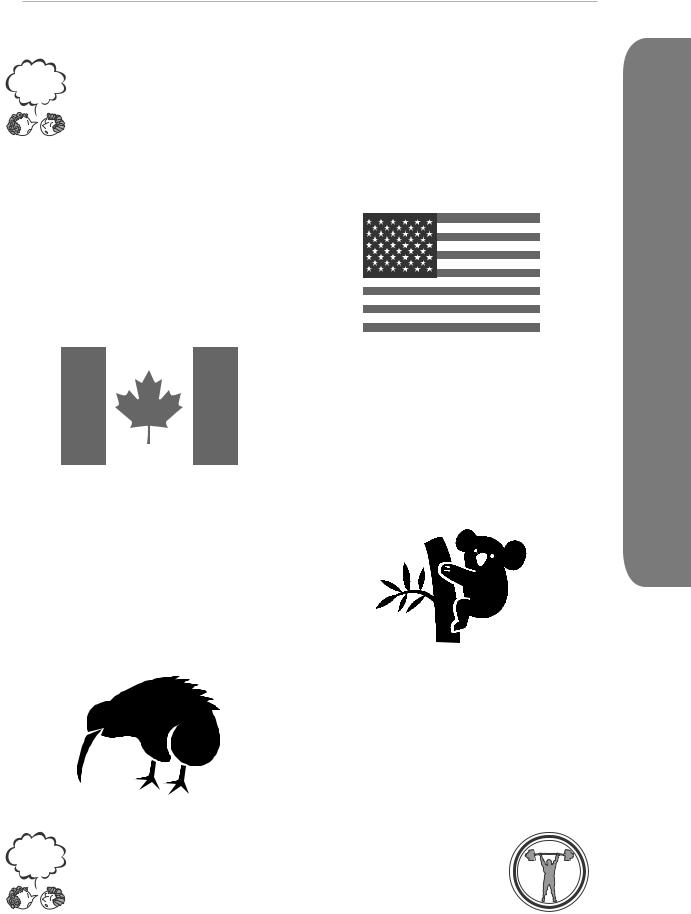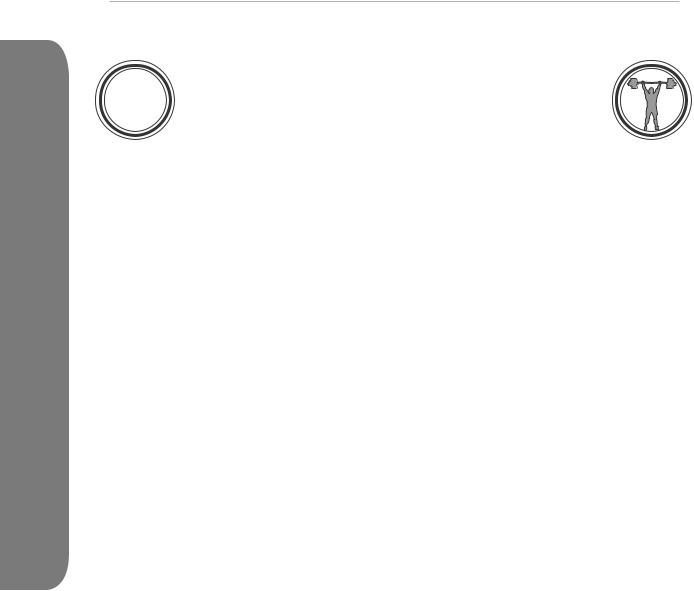
yastrebova_Part_1
.pdf
11.The Scottish / Scots Parliament is the / a democratically elected body comprising 129 members.
12.By the time they met they were / had been both experienced and effective officers.
13.The 17th century was the great age of Holland / Dutch painting.
14.Julia looked thin and hungry because she was / had been working out and dieting.
15.The Danes / the Danish refused to surrender and the British / Britons’ fleet started a four-day bombardment of Copenhagen on September 2, 1807.
16.We had been walking / had walked ten miles in the / a rain since an early breakfast and we were starving.
17.I hadn’t slept / hadn’t been sleeping for 27 hours and was exhausted.
18.As his experience was growing / grew, Collins devoted more time to arts study.
19.Helen’s husband is a Polish / Pole.
20.If you find some / any incorrect information, please send the / an email to the operator.
5.Fill in the gaps and give the right response.
1.A: Mr. Green, let me introduce Ms. Gordon, our sales manager.
Mr. Green:
2.A: Can you pass me the water, _________.
B:
3.A:____________, Simpson. I must be going. The train leaves in an hour.
Simpson:
4.Bill Ox: Good morning, Mrs. Blake. How are you today?
Mrs. Blake:
5.A: Thank you ____________ for the baby sitter. She is a real gem.
B:
6.Hi, Katja. __________ David, our new student.
Katja:
6. Check your basic knowledge of the UK using the site: http://www.englisch-hilfen.de/en/exercises/great_britain.htm

UNIT 2
ACROSS
THE ATLANTIC

Chapter 1. Unit 2. Across the Atlantic
 Английский язык для международников и регионоведов. Часть I
Английский язык для международников и регионоведов. Часть I
IN UNIT 2 YOU LEARN:
to ask for information
to compare people and things to read faster
to look for information
LANGUAGE FOCUS
comparison of adjectives articles with proper nouns say, speak, tell, talk phrasal verbs “tell”, “talk”
participle (-ing or -ed) adjectives
SPEAKING 1. ASKING FOR INFORMATION
I. GENERAL (YES / NO) QUESTIONS
STRUCTURE
|
Auxiliary |
|
|
|
|
|
|
|
|
|
|
||
|
+ |
|
Subject |
|
+ |
|
|
|
|
|
|||
|
|
|
|
Verb |
|
|
…? |
||||||
|
|
|
|
|
|
|
|
|
|||||
|
|
Verb |
|
|
|||||||||
|
|
|
|
|
|
|
|
|
|
|
|
|
|
|
|
Do |
|
|
you |
|
speak |
|
French? |
||||
|
|
Was |
|
Moscow |
|
founded |
in 114 7? |
||||||
|
Have |
|
your family |
|
been |
to |
London? |
||||||
|
|
BUT |
|
|
|
|
|
|
|
|
|
|
|
|
|
|
|
|
|
|
|
|
|
|
|
|
|
|
|
Are |
|
|
you |
|
|
|
|
a |
student? |
||
Note:
1.We normally ask general questions with a rising tone.
2.We give short answers to general questions, but a mere yes or no is impolite. e.g.
‘Are you a  high school student?
high school student?
‘No, I am  not.
not.
Do you ‘study Chi  nese?
nese?
‘Yes, I  do.
do.
TASK 1. PAIRWORK
Practise asking and answering general questions. Use the suggestions below. Instead of he / she / they use the names of people your partner knows for sure.
e.g.
Did he…?
Did the president speak on TV yesterday? Is there …?
Is there a lunch break after this class?
1.Is it (rain, now)?
Are there (many students, group)? Do you (come from)?
64

 Английский язык для международников и регионоведов. Часть I
Английский язык для международников и регионоведов. Часть I
Did he/she (classmate, see)?
Were you/they (parents, at home)?
Can you/he/she (speak Chinese)?
Is she (Madonna, film star)?
Did he (Tolstoy, write)?
2. Did they (the English, settle)? Was he (Columbus)?
Is it (a monarchy)?
TASK 2. CAN YOU READ THE MAP?
Ask each other general questions and answer them using the map of the Englishspeaking world (See Supplement).
e.g.
Is the English language widespread? Yes, it is.
Do the French speak English as their second language? No, they don’t.
II. SPECIAL (WH-) QUESTIONS
STRUCTURE
|
Question |
|
+ |
|
|
+ |
|
|
|
+ |
|
|
|
|
||
|
|
Auxiliary |
|
|
Subject |
|
|
Verb |
|
…? |
||||||
|
|
|
|
|
|
|
|
|
|
|||||||
|
|
word |
|
|
||||||||||||
|
|
|
|
|
|
|
|
|
|
|
|
|
|
|
|
|
|
When |
|
was |
|
Moscow |
|
founded? |
|
||||||||
|
|
Why |
|
do |
|
Australians |
|
speak |
English? |
|||||||
Which places |
|
did |
|
|
you |
|
|
visit |
there? |
|||||||
Note:
1.We normally ask special questions with a falling tone.
2.We give a specific answer to special questions. e.g.
‘When was Moscow  founded?
founded?
In 1147. (to sound more polite add I think, I believe: e.g. I think in 1147.)
Note: |
which + noun and what + noun are often used |
|
NB |
with little difference in meaning. |
|
which +ones (s) and |
||
But: |
||
|
which +of + noun / pronoun (not: what+one(s)/noun/pronoun). |
e.g.
There are two roads. Which one do you want to take? Which of the groups reached the fort first?
Chapter 1. Unit 2. Across the Atlantic
65

Chapter 1. Unit 2. Across the Atlantic
 Английский язык для международников и регионоведов. Часть I
Английский язык для международников и регионоведов. Часть I
QUESTIONS IN WHICH WHO / WHAT IS USED AS THE SUBJECT
STRUCTURE
Question |
+ |
|
|
|
|
||
|
Verb |
|
…? |
||||
|
|
|
|
|
|||
|
word |
|
|||||
|
|
|
|
|
|
|
|
|
Who |
|
discovered |
Aus tralia? |
|||
What |
|
|
is |
to the north of the USA? |
|||
Note: the verb after who or what is normally singular, even if a plural answer is expected. e.g.
‘Who ‘wants to ‘go to the  cinema? — We
cinema? — We  all do. ‘What is there in this
all do. ‘What is there in this  box? — His
box? — His  English books.
English books.
BUT: Who are the people over there?
Warm-up. Think of a story behind one of the sentences.
1.He went abroad.
2.The lecturer / doctor arrived.
3.They / she / we survived.
4.The union disintegrated.
5.The army won.
6.They had an argument./They quarrelled.
Answer as many wh-questions as other students can ask but do not give all the information at once! The fi rst is done as an example.
e.g. He went abroad.
A story
The Russian President went on an official visit to (name a country) last week. He was accompanied by his wife and the Minister of Foreign Affairs. They arrived in (name the capital) on Monday afternoon. The Prime Minister / President of the country met the Russian President at (name) Airport. The two presidents had talks and signed an agreement on (economic / cultural / environmental / etc. cooperation). The visit was quite successful. They left for Moscow /…. on Wednesday.
POSSIBLE QUESTIONS:
Who went abroad?
Which president went abroad?
Which / what country did he / she visit?
Who went with him?
When did he / they go to…?
How did they get to…?
What kind of visit was it?
Why did he go to…?
66

 Английский язык для международников и регионоведов. Часть I
Английский язык для международников и регионоведов. Часть I
TASK 1. PAIRWORK.
Find out more about English-speaking countries. Student A asks questions using the prompts below. Student B answers them using a card with a fact fi le to be found in Appendix if necessary.
Student A.
Set 1. The USA and Canada
1.who / Native Americans
2.the name “Canada” / to mean
3.the first name of New York
4.what / WASP
5.how many / stars, stripes, the first flag
6.Canada, member, the British Commonwealth
7. which / American state, close to Siberia
8. language, California
9. origin, the Statue of Liberty
10. discovery of America for Russia, to begin
11. which / to join the USA, last
12. country, two official languages
Set 2. Australia and New Zealand
1.who / native people, Australia
2. native people of New Zealand
3. member of the British Commonwealth 4. why / to stay white and English-speaking
5.the population of Australia, small
6.the world’s biggest farm, New Zealand
7. more sheep than people
8. which / “upside down”, country
9. to show on the flag, the Southern Cross 10. to set up Australia’s first Biological Marine
Station
11. New Zealand, to become a colony
12. Australia and New Zealand, to have closer economic links
TASK 2. PAIRWORK.
Ask each other questions about the history of Russia. Try to fi nd out what your partner knows about the growth of the Russian Empire.
TASK 3.
Ask your teacher similar questions. Help to answer them if he / she fi nds some of them difficult.
Chapter 1. Unit 2. Across the Atlantic
67

Chapter 1. Unit 2. Across the Atlantic
 Английский язык для международников и регионоведов. Часть I
Английский язык для международников и регионоведов. Часть I
SPEAKING 2. PROVERBS AND SAYINGS
Proverbs and sayings make one’s speech idiomatic;
they are very useful when one wants to make a point or illustrate an idea.
Do you know any of the following proverbs?
East or West, home is best.
When in Rome, do as the Romans do.
Success is never blamed.
Nothing succeeds like success.
Union is strength.
United we stand, divided we fall.
So many countries, so many customs.
The customer is always right.
Stretch your arm no further than your sleeve will reach.
Too much of a good thing is good for nothing.
TASK 1.
Look at the list of proverbs and sayings. Think of a short story which can be summed up by one of these.
e.g.
I enjoy travelling. I think one must take every opportunity to visit new places and see the world. At least that’s what I always do. This summer I went to Crete with my friends. It was wonderful. We travelled all round the island and enjoyed the magnificent scenery and the historical places which tell the story of the island’s turbulent past. The hotel was good, the food excellent and the swimming fantastic. But to be honest, I was happy to return home. Coming home is one of the best things about travelling. East or West, home is best.
TASK 2.
Think of a similar Russian proverb or saying and try to explain its meaning to an imaginary English-speaking partner.
e.g.
East or West, home is best. ~ В гостях хорошо, а дома лучше.
The Russian proverb similar to that one is, however, somewhat different. The first part of it actually says that being a guest is good/enjoyable; the second is pretty much the same as in English: being at home is even better!
READING AND SPEAKING
TASK 1.
Read the text about the American expansion to the West and ask your teacher questions to fi ll
in the information gaps.
The opening of the West in 1) _______ was one of the most exciting and adventurous times in the United States history. It was also a part of the long, tragic story of America’s dealings with the Indians.
68

 Английский язык для международников и регионоведов. Часть I
Английский язык для международников и регионоведов. Часть I
The attitudes of 2) ___________________ towards American Indians grew out of two primary concepts. First, they thought of Indians as culturally inferior, savage and amoral. Hence, the whites felt 3) __________________ for all Indians. The second concept was that Indians lived on vast areas of valuable land which was rightfully American. Even 4) _____________________ frontiersmen, who admired the Indian peoples, believed that the Indians had to be pushed aside. The idea was that the Indians should be pushed into an area 5) ____________________________.
As the first explorers marched into the West, they carried out the dream of 6) _____________. The end result of their march was that the land was virtually free of 7) _______.
TASK 2.
Find out the details of Russia’s advance to the Pacifi c. Ask each other wh-questions (question words are given in brackets) to fi ll in information gaps in your text ( A or B) Student A begins.
Text A (Text B is given in Appendix)
The Russian annexation of Siberia began in 1) ___________________ (when). The powerful Stroganov family, who had created a commercial empire in the region near the city of Perm just west of the Ural Mountains, hired a Cossack detachment led by 2) ____________________
(who) to defeat the Khanate of Sibir on the other side of the Urals so that the family could expand its empire. In 1582 Ermak and his band of merry men crossed the Ural Mountains and conquered 3) ____________________________ (what). Thus began a century of Russian conquest of Siberia.
After the fall of Sibir, Russians met with very little resistance in the Eastern World in their advance to the Pacific. It took them 4) _______________________ (how long) to reach the Pacific.
Russian Cossacks, fur trappers, and government officials moved eastward, reaching
5)_________________________ (what) in the east and ____________________ (what) in the south, to claim all of Siberia (excluding Kamchatka and the Amur region) for the Russian empire.
The Russians were moving so rapidly across such a vast territory in search of “soft gold” — fur. One could say that this was the Russian “gold rush”. Trappers wandered the wilderness
6)_______________ (why). Cossacks and government officials subjugated (подчинять) aboriginal population, either by 7) __________________ (how), and made them pay tribute in fur to the Russian tsar.
Explorers following the routes of the first expeditions built forts and trading posts to control the vast territory. In 1586 Tyumen was founded and a year later Tobolsk. The town of
8)________________________ (which / what + noun) was built on the Tom River in 1604 and in 1607 much farther north a trading post, Turukhansk, was established. In 1632 a Cossack leader, Pyotr Beketov, founded a fort 9) _________________ (where), which is now Yakutsk, one of the coldest cities on earth. When the Russians reached the Pacific Ocean in 1649, they established Okhotsk, the first Russian settlement in the Russian Far East.
In 1648, the famous explorer Semen Dezhnev sailed around the far northeastern tip of the continent and proved that 10) _____________________ (what). At that time he didn’t know how important his discovery was.
Chapter 1. Unit 2. Across the Atlantic
69

Chapter 1. Unit 2. Across the Atlantic
 Английский язык для международников и регионоведов. Часть I
Английский язык для международников и регионоведов. Часть I
Project |
PROJECT WORK 1 |
|
RUSSIA’S ADVANCE TO THE EAST VS |
||
Work |
||
|
AMERICA’S ADVANCE TO THE WEST |
TASK 1.
Find more information about Russia’s conquest of Siberia and the Far East; about the American Frontier and the push to the West. Consult Wikipedia; you can also make use of the books available in the library or search in the internet. Concentrate on the following questions:
When did it start?
How much bloodshed was involved?
Who were the people who took part in it?
What effect did it have on the indigenous population?
How long did it take to reach the Pacific?
What was gained as a result?
How much effort did it take?
TASK 2.
Read the text «Присоединение и освоение Сибири в XVII веке» and retell it in English using the words below.
Присоединение и освоение Сибири в XVII веке
В XVII веке поток русских первопроходцев неудержимо устремился в Сибирь. В то время как на западе Россия приобретала каждый клочок земли, каждый город, каждую крепость ценой тяжких усилий и огромных потерь, восточные границы отодвигались все дальше и дальше с невероятной быстротой. За одно столетие территория Московского государства выросла в несколько раз — в основном за счет продвижения на востоке. Для того, чтобы пересечь страну, теперь требовались годы. Присоединение этих земель было результатом мужества, энергии, знаний, ратных навыков и дипломатических способностей русских первопроходцев — казаков, крестьян, государевых служилых людей.
Русское правительство старалось не прибегать к силе и проводило покровительственную политику по отношению к коренному населению. Естественно, правительство действовало в своих собственных интересах, намереваясь сохранить как можно больше населения способного платить ясак (налоги). Русским людям разрешалось селиться только «на пустых местах и у ясачных людей угодий не отнимать». Не разрешалось насильственное крещение, превращение в холопов (крепостных) и продажа ясачных людей.
Words to be used: trappers and pioneers, military skills, to conduct paternalistic policy, indigenous population, to push aside, to convert to Christianity by force, serf.
TASK 3.
Make a list of things these two events have in common and a list of differences between the two.
70

 Английский язык для международников и регионоведов. Часть I
Английский язык для международников и регионоведов. Часть I
TASK 4.
Compare the two events. Make your conclusions and present them to the class. Useful expressions:
There are certain features/aspects ……..have in common
The main thing is …
The main difference between the two is…
First of all …
Secondly/Thirdly,…
To sum up,…
READING 1. THE UNITED UNITED STATES
PRE-READING TASK: CHECK YOUR KNOWLEDGE OF THE
AMERICAN HISTORY.
History quiz
1.Who do Americans call the Pilgrim Fathers?
2.What was the name of the ship they sailed in?
3.Where did they settle?
4.What did the English call North America, which they considered their possession? Why?
5.How many colonies did the British have in North America?
6.What war did the Americans win in 1783?
7.In which direction did the American pioneers move?
8.What was the American Frontier at that time?
9.What war did they go to in 1860?
10. Which countries gave in their territories to the United States?
TASK 1.
Now read the text “The United United States” in Appendix to fi nd out if your answers are correct.
TASK 2.
a) Practice reading the following proper nouns aloud.
Columbus |
Mississippi |
Walter Raleigh |
Louisiana |
|
|
Virginia |
Florida |
|
|
Roanoke Island |
France |
|
|
Drake |
Midwest |
|
|
Pilgrim Fathers |
Hawaii |
|
|
Cape Cod |
Europe |
|
|
Plymouth |
European |
|
|
Appalachian Mountains |
Southern |
|
|
b) Practice reading the text out loud |
|
Chapter 1. Unit 2. Across the Atlantic
71
